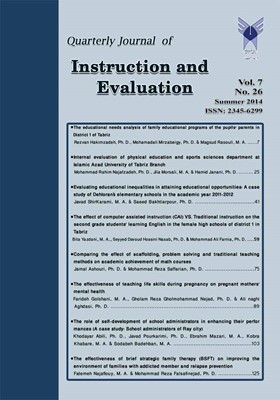The educational needs analysis of family educational programs of the pupils' parents in District 1 of Tabriz
Subject Areas : Educational PsychologyFatemeh Najaflouy 1 , Mohammad Reza Falsafinejad 2 , Magsud Rasouli 3
1 - دانشکده روانشناسی و علوم تربیتی دانشگاه تهران
2 - دانشیار دانشگاه تهران
3 - دانشآموخته کارشناسیارشد آموزش بزرگسالان دانشگاه تهران
Keywords: parent education, Educational needs, Educational need analysis, family education,
Abstract :
The present research was conducted in order to study the educational needs of the parents taking part in family education programs of Tabriz District 1 Educational Office. The present study is a descriptive-survey based research, and an applied research in terms of its results. The population of the study included the parents of all students, in the academic Year 91-92. Cluster random sampling was used for selecting 382 parents. To collect the data three Lickert scale researcher-made questionnaires of were prepared. The primary school learners' parental questionnaire included 59 fixed answer questions and 1 open-ended question; the questionnaire for junior high school learners included 55 fixed answer questions and one open-ended question and the questionnaire for senior high school students included 62 fixed answer questions and one open-ended question. The face validity and content validity of the questionnaires were verified by the supervisor and four professors from Tabriz University, and their reliability in Cronbach Alpha was calculated to be 0.980, 0.871 and 0.976. To achieve research goals, 5 research questions were posed. To analyze the data the descriptive statistics including frequency, median and mean and the inferential statistics of independent t-test, one-way-ANOVA of SPSS software were conducted. The results from the study indicate that the most important educational needs of the parents in family education programs from the parents' point, of view are religious-moral needs. Cultural-social, educational - psychological, emergent issues and hygienic - physical dimensions were respectively the parents' other educational needs. The results also indicate that there is no significant difference between the educational needs of the parents and variables like sex, age, educational level, and the parents' job.
اسدی، شهرام(1378). بررسی میزان تأثیر آموزش خانواده بر تغییر رفتار والدین نسبت به فرزندان خود در دورۀ راهنمایی و متوسطه شهرستان شهرضا. فصلنامه تعلیم و تربیت، شماره68، زمستان: 102-81.
بازرگان، زهرا (1387). محیط فرهنگی خانواده و انگیزۀ مطالعه در کودکان. مجله پیوند، شماره 349، آبان: 6-4.
برود هرست، دایاندی (1380). نقش مربیان و معلمان مدارس در پیشگیری و درمان کودکآزاری و غفلت از کودکان. ترجمۀ شهرام محمدخانی. تهران: انتشارات ورای دانش.
بزرگیان، منصور (1389). شناسایی عوامل مؤثر بر بهبود کیفیت دورههای آموزش خانواده در مدارس متوسطه شهر صحنه در سال تحصیلی 89-88. پایاننامۀ کارشناسیارشد، دانشگاه تهران (چاپنشده).
به پژوه، احمد (1391). خانواده و کودکان با نیازهای ویژه. تهران: انتشارات آوای نور.
تقیزاده، احسان (1375). اهمیت آموزش خانواده و ضرورت بازنگری در آن. تهران: ماهنامۀ تربیت، دورۀ یازدهم، شماره 10: 123-121.
ثابتی، حسن (1375). بررسی نگرش اولیاء دانشآموزان دربارۀ عوامل مؤثر در جذب آنها به کلاسهای آموزش خانواده در شهر یزد. پایاننامۀ کارشناسی ارشد، دانشگاه شهید بهشتی (چاپنشده).
جیگود، ویلیام (1973). خانواده و جامعه. ترجمۀ ویدا ناصحی(بهنام)(1352). تهران، بنگاه ترجمه و نشر کتاب.
طالبزادهنوبریان، محسن (1385). طراحی، اجرا و ارزشیابی آموزش خانواده. تهران: انتشارات پیام مؤلف.
عصاره، علیرضا و نصری، صادق (1383). بررسی نیازهای آموزشی و تربیتی والدین دانشآموزان مقطع متوسطه کشور در خردهفرهنگهای مختلف ایران. تهران، فصلنامه نوآوریهای آموزشی: شماره 14، زمستان 1384.
فتحآبادی، جلیل و عمویی، رضا (1381). بررسی عملکرد کلاسهای آموزش خانواده از نظر والدین و مدیران مدارس شهرستانهای استان تهران. شورای تحقیقات سازمان آموزش و پرورش شهرستانهای تهران (چاپ نشده).
قمریمهران، علیاشرف (1377). بررسی نظرات اولیاء، مدیران و مدرسین پیرامون علل گرایش و عدم گرایش اولیاء نسبت به آموزش خانواده. شورای تحقیقات سازمان آموزش و پرورش استان همدان (چاپ نشده).
محمدخانی، کیهان (1376). بررسی نگرش والدین دانش آموزان شهر تهران در مورد میزان اثربخشی برنامههای آموزش خانواده در برآوردن نیازهای آموزشی آنان. پایاننامۀ کارشناسیارشد، رشته آموزش بزرگسالان، دانشکده روانشناسی و علوم تربیتی، دانشگاه شهید بهشتی (چاپنشده).
نبوی، سید صادق (1384). نیازسنجی آموزشی اولیاءی دانشآموزان جهت آموزش خانواده در مدارس. تهران: فصلنامه خانواده و پژوهش. سال دوم، شماره 3، پاییز: 115-97.
Besser, Richard. ; Falk, Henry. ; Arias, Ileana. ; Hammond, Rodney. (2009). Parent Training Programs: Insight for Practitioners. U. S. Department of Health and Human Services, Atlanta, Georgia.
Chalker, D. & Hurley, J. C. (1993). “Beastly People”, Executive Deucator, 15(1): 24- 26.
Galan, V. & Jane, A. (1987). Explain Home Education: Oarents Accounts of their Decisions to Teach Their Own Children. Journal Article (080), Research Report (143). Urban Review, V.19, N.3. P: 167- 177.
Kurcinka, M. S.; Marietta, R. & Mary, S. (2011). Parent Education Core Curriculum Framework. Minnesota Association for Family and Early Education (MNAFEE).
Levenstein, Phyllis. ; Levenstein, Susan. (2008). Massages from Home: The Parent–Child Home Program for Overcoming Educational Disadvantage. Philadelphia: TEMPLE UNIVERSITY PRESS. Copyright©2008 by Temple University All rights reserved Published 2008.
Pamela E. Davis-Kean. (2005).The Influence of Parent Education and Family Income on Child Achievement: The Indirect Role of Parental Expectations and the Home Environment. University of Michigan: Journal of Family Psychology Copyright 2005 by the American Psychological Association 2005, Vol. 19, No. pp2, 294–304.
Suarez, T.M. (1991). Need Assessment Studies.International encyclopedia of curriculum. " Edited By: Anderson. Pergamon Press. P: 433-35.


